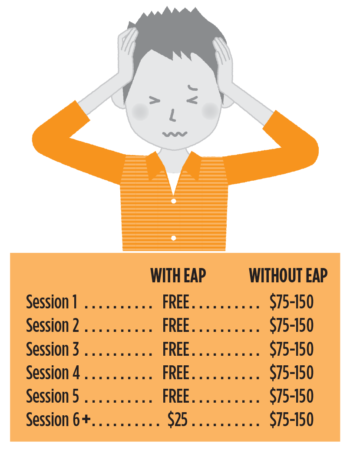by Alyssa Janssen

Significant life changes can cause major stress in a person’s life and make a person feel as though they are stuck, which is when Leticia Flores says is the best time to reach out for some help.
Changes can come in many forms such as divorce, the death of a loved one, giving birth or a traumatic illness.
“The time when most people seek services is when the old ways of managing stress aren’t working anymore and may even be causing problems,” says Flores, director of the UT Psychological Clinic. “Some red flags are when people find that they are engaging in unhealthy behaviors like drinking too much alcohol, or drinking more frequently, or if they notice that they are getting into more arguments with friends, loved ones, co-workers or even strangers.”
Physical symptoms can also be signs of psychological or emotional trouble: Trouble falling asleep or sleeping too much; eating too much/little or gaining/losing significant weight, and headaches or stomachaches.
“These are worth talking about with a therapist, as well as checking in with your medical provider,” Flores says.
With the approaching holidays, the feelings of anxiety and stress can become even more intense. Flores says that people can put pressure on themselves to have the “perfect” holiday, and not achieving that perfection can lead to disappointment and depression. The absence of a loved one can also make the holidays more difficult, as these are times families come together. Flores says that those wishing to seek therapy before the holidays should look sooner than later.
“It’s a great idea to start therapy before the holidays, like some psychological ‘preventive medicine,’” Flores says. “Being able to explore what the holidays have been like with a therapist and to be able to explore either how you can at most change the circumstances or at least better manage your reactions to the circumstances can equip you to enter the holiday season with more confidence in your ability to engage in what we call ‘self-care’ during an often-stressful period of time.”
While it may be clear to some why therapy could be beneficial, for some a strong stigma is attached to therapy.
“I think some people also assume that only ‘very sick’ people go to therapy,” Flores says. “It’s similar to how people treat their medical doctors—some folks get their yearly physical and check-up, while others only see the doctor when they have an emergency. But it’s well understood within the field of psychology that good preventive mental health care is just as important as good preventive medical care, and the two are often related.”
Flores adds the ultimate benefit of therapy is feeling better. She says that the simple act of just talking to someone can be therapeutic in itself.
While therapy may seem daunting on its own, the price can also be a deterrent to seeking counseling. Office visits can range from $75 to $150 per session and are often not covered under insurance. Through the state’s Employee Assistance Program (EAP), UT employees have access to counseling as well as legal and financial professionals at little to no cost. EAP provides employees with confidential assistance to help employees and their families resolve problems that influence their personal lives or job performances.
“EAP is a great way to ‘sample’ what therapy can be like,” Flores says. “You have a few sessions to get a sense of what it’s like to talk with someone, you build a rough sketch of what your concerns are and with that information, you can decide whether continuing with someone in longer-term work is right for you. And sometimes, just meeting with someone for a few sessions can be all it takes to get some balance back into your life and to get some ideas for how you can resolve your problems going forward.”
Flores has a few pieces of advice for those who choose to see a therapist.
“By taking care of your own mental health, you are also better able to take care of those loved ones around you. Go with an open mind and an expectation that the therapist is there to help you help yourself,” she says. “And be patient with yourself and the process—sometimes it takes a few tries to find a good therapist, or it takes a few weeks to get in the rhythm of therapy—don’t give up before you give it a good chance to start working. Ask lots of questions if you have them—you are expected to be an active collaborator in the therapy process, and so the better informed you are about the work, the better your chances of making the most of the time.”
To learn more about EAP and to find a therapist in your area, visit www.Here4TN.com or https://hr.tennessee.edu/benefits/employee-assistance-program/.
Recommended Resources
The Tennessee Mental Health Consumers’ Association https://tmhca-tn.org/
Psychology Today https://www.psychologytoday.com/us
National Alliance for the Mentally Ill https://www.nami.org/Learn-More/Mental-Health-Conditions
Tags: Employee Benefits, Health

